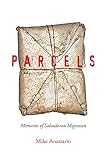Parcels : Memories of Salvadoran Migration / Mike Anastario.
Material type: TextSeries: Latinidad: Transnational Cultures in thePublisher: New Brunswick, NJ : Rutgers University Press, [2019]Copyright date: ©2019Description: 1 online resource (200 p.) : 12 b-wContent type:
TextSeries: Latinidad: Transnational Cultures in thePublisher: New Brunswick, NJ : Rutgers University Press, [2019]Copyright date: ©2019Description: 1 online resource (200 p.) : 12 b-wContent type: - 9780813595221
- 9780813595269
- 973.04687284 23/eng
- online - DeGruyter
- Issued also in print.
| Item type | Current library | Call number | URL | Status | Notes | Barcode | |
|---|---|---|---|---|---|---|---|
 eBook
eBook
|
Biblioteca "Angelicum" Pont. Univ. S.Tommaso d'Aquino Nuvola online | online - DeGruyter (Browse shelf(Opens below)) | Online access | Not for loan (Accesso limitato) | Accesso per gli utenti autorizzati / Access for authorized users | (dgr)9780813595269 |
Frontmatter -- CONTENTS -- Introduction -- Part I: Diasporic Remembering -- 1. Es Barata y Es Cara: Couriers and Parcels in Transnational Space -- 2. A Sequence of Undocumented Migrant Memories -- 3. Diasporic Intimacy and Nostos Imaginaries -- 4. We Do Not Have to Learn to Be What We Are Not: Memory and Imagination in the Rural Diaspora -- Part II: The U.S. Fugue State -- 5. Silence and Systematic Forgetting -- 6. Fields of Violence -- 7. Deferments of Voice, Myopic Reflections -- Conclusion -- Appendix: Research Methods -- Acknowledgments -- Notes -- Index -- ABOUT THE AUTHOR
restricted access online access with authorization star
http://purl.org/coar/access_right/c_16ec
In light of new proposals to control undocumented migrants in the United States, Parcels prioritizes rural Salvadoran remembering in an effort to combat the collective amnesia that supports the logic of these historically myopic strategies. Mike Anastario investigates the social memories of individuals from a town he refers to as "El Norteño," a rural municipality in El Salvador that was heavily impacted by the Salvadoran Civil War, which in turn fueled a mass exodus to the United States. By working with two viajeros (travelers) who exchanged encomiendas (parcels containing food, medicine, documents, photographs and letters) between those in the U.S. and El Salvador, Anastario tells the story behind parcels and illuminates their larger cultural and structural significance. This narrative approach elucidates key arguments concerning the ways in which social memory permits and is shaped by structural violence, particularly the U.S. actions and policies that have resulted in the emotional and physical distress of so many Salvadorans. The book uses analyses of testimonies, statistics, memories of migration, the war and, of course, the many parcels sent over the border to create an innovative and necessary account of post-Civil War El Salvador.
Issued also in print.
Mode of access: Internet via World Wide Web.
In English.
Description based on online resource; title from PDF title page (publisher's Web site, viewed 21. Jun 2021)


